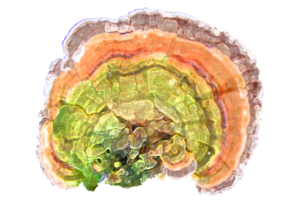Christopher Hobbs
ABSTRACT
Trametes (=Coriolus) versicolor (L.:Fr.) Pilát, is a small, flexible polypore fungus that is an important part of the forest ecology as a recycler of dead and dying trees in forests throughout the world. Of all the mushrooms used today for their medicinal qualities, more research has been performed on this species than any other, including shiitake (Lentinus edodes), or reishi (Ganoderma lucidum).High-molecular-weight fractions from the mycelium have been studied in human clinical trials, especially polysaccharide Krestin (PSK), which is an approved drug paid for by national health care in Japan. PSK is given orally (often 3 grams/day), along with several chemotherapy protocols. Numerous in vitro and in vivo studies show enhancement of immune functions, antiviral effects, and cholesterol-regulating effects, among others. New clinical trials demonstrate improved quality of life after surgery and in combination with chemotherapy, as well as extended 5- and 10-year survival rates, especially for patients with colorectal and stomach cancer. Further studies are needed in order to clarify the most effective forms of the whole fruiting body extracts, mycelium extracts, and their high-molecular weight fractions, along with the optimum dose. Safety issues, while not completely determined for long-term treatment, during pregnancy, or in combination with pharmaceutical drugs, seem to be of low concern, with no noted published side effects or interactions with drugs reported.
Reference:
DOI: 10.1615/IntJMedMushr.v6.i3.10 24 pages

